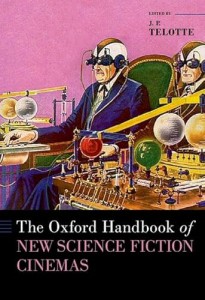The Oxford Handbook of New Science Fiction Cinemas


Average rating: ![]()
| 0 | rating | |
| 0 | rating | |
| 0 | rating | |
| 0 | rating |
Your rating: -
Book Presentation:
The Oxford Handbook of New Science Fiction Cinemas provides novel insight into the rapidly developing genre of science fiction. In contemporary film, science fiction is a key locus both for displaying and for imaginatively addressing social and cultural issues. Today, popular modes of this cinema have transformed the nature of the genre, directly incorporating pressing concerns about racial tensions, the environment, and gender inequality, among other cultural and social issues. This volume defines these new modes as slant forms of science fiction, changing a genre most often associated with the icons of science and technology into a substantially new range of science fiction cinemas.
This handbook presents two groups of essays, both of which explore what these new science fiction cinemas address and how viewers can better navigate these films. The first group of essays provides a contextual and historical definition for a selection of slant types, featuring analyses of examples such as Afrofuturism, biopunk cinema, feminist science fiction, heterotopic spaces, and superhero cinema. The second group offers a broader theoretical vantage on some of the critical and revolutionary slants informing contemporary science fiction, including topics like bioethics, cult behaviors, gender and queer theory, and posthumanism. From exploring new theoretical approaches to highlighting new cultural attitudes, this volume presents the science fiction cinema not only as a flexible and adaptable process, but also as a reflection of contemporary culture's own evolution.
About the Author:
J. P. Telotte, Professor Emeritus of Film and Media Studies, Georgia Institute of Technology J. P. Telotte is Professor Emeritus of Film and Media Studies at Georgia Institute of Technology. He is the co-editor of the journal Post Script, and has published widely on film and television, with a special emphasis on science fiction media. His most recent publications include Robot Ecology, Animating the Science Fiction Imagination, and Movies, Modernism, and the Science Fiction Pulps.
Press Reviews:
"...future researchers can build on many ofthe great ideas explored in this Oxford Handbook." - Troy Michael Bordun, Science Fiction Studies, Volume 51
> From the same author:
Science Fiction Double Feature (2021)
The Science Fiction Film as Cult Text
Dir. J. P. Telotte and Gerald Duchovnay
Subject: Genre > Science Fiction
Movies, Modernism, and the Science Fiction Pulps (2019)
Subject: Genre > Science Fiction
Science Fiction Film, Television, and Adaptation (2013)
Across the Screens
Dir. J. P. Telotte and Gerald Duchovnay
Subject: Genre > Science Fiction
Voices in the Dark (1988)
The Narrative Patterns of Film Noir
> On a related topic:
Amazing Worlds of Science Fiction and Science Fact (2025)
by Keith Cooper
Subject: Genre > Science Fiction
Societies in Space (2025)
Essays on the Civilized Frontier in Film and Television
Dir. Gary Westfahl
Subject: Genre > Science Fiction
Robots That Love (2025)
Artificial Amours in Myth, Folklore, Literature, Popular Culture and the Real World
Subject: Genre > Science Fiction
The Future Was Now (2025)
Madmen, Mavericks, and the Epic Sci-Fi Summer of 1982
Subject: Genre > Science Fiction
The Science Fiction Film in Contemporary Hollywood (2025)
A Social Semiotics of Bodies and Worlds
Subject: Genre > Science Fiction
Feminist Posthumanism in Contemporary Science Fiction Film and Media (2025)
From Annihilation to High Life and Beyond
Dir. Julia A. Empey
Subject: Genre > Science Fiction
Female Robots and AI in Science Fiction Cinema (2025)
The Fabular Femininity of Gynoids
Subject: Genre > Science Fiction
Cyberpunk (2024)
Envisioning Possible Futures Through Cinema
Dir. Doris Berger
Subject: Genre > Science Fiction
Fantastic Planets, Forbidden Zones, and Lost Continents (2024)
The 100 Greatest Science-fiction Films
Subject: Genre > Science Fiction